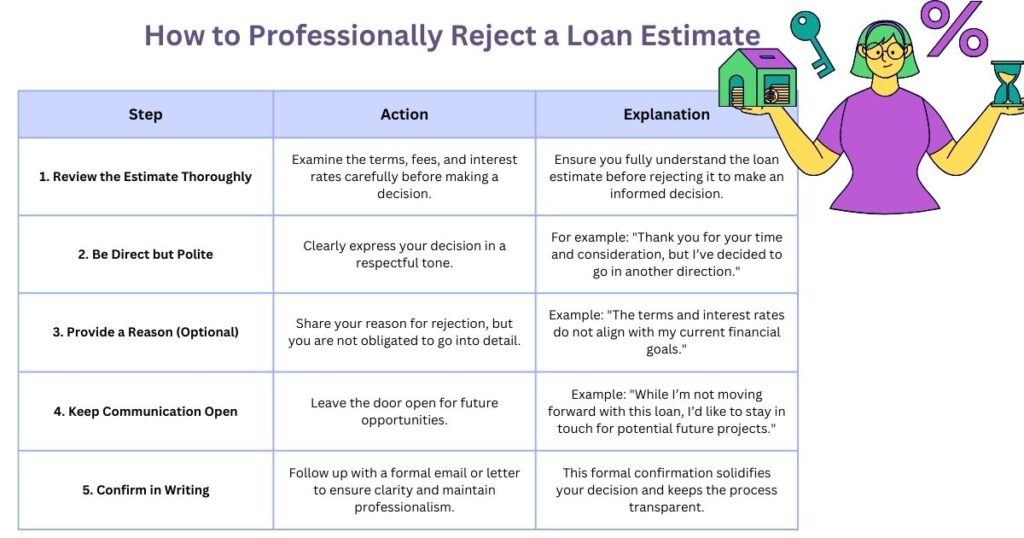Table of Contents
ToggleIntroduction
If you are in search of quick access to capital funding, then securing a viable hard money loan deal is the best option. The application process for a hard money loan essentially involves early communication of a loan estimate that outlines pivotal points about your loan, such as repayment terms, interest rates, and other fees.
But what if you don’t find the proposed loan estimate an acceptable deal ?
Rejecting a hard money loan estimate is not just a simple ‘no’ and has its own potential consequences. In this blog, we will help you navigate this crucial point in the borrowing process and how to proceed wisely while making an informed decision.
Hard Money Loan Estimates: Why They Matter and What to Know?
Hard money loan estimates are a transparent breakdown of the entire lending structure that provides borrowers with a snapshot of the loan’s key terms and associated costs. It helps borrowers to make better investment decisions and comprehend the bigger picture before committing to the process.
Imagine that you are an investor who is interested in buying a flip project to gain profits. You ultimately approach hard money loan lenders to secure finances for your investment plans. They propose a detailed loan estimate, which is a document that entails all the essential costs, terms, and conditions of the loan.
But as you dive deeper into the lending structure, you are surprised with terms like’ origination fees,’ ‘balloon payment,’ and other associated terms of which you are unaware. Let us break these not-so-common terminologies with an easy example to decide if the loan fits your needs or not:
|
Category |
Details |
Explanation |
|
Loan Amount |
$200,000 |
The principal amount you’re borrowing from the lender. |
|
Interest Rate |
10% |
The annual cost of borrowing the loan, typically higher for hard money loans. |
|
Origination Fees |
2% ($4,000) |
A fee charged upfront for processing the loan. |
|
Term Length |
12 months |
The duration within which the loan must be repaid. |
|
Monthly Payment |
$1,667 (interest-only) |
Many hard money loans require interest-only payments during the term. |
|
Balloon Payment |
$200,000 |
The remaining principal amount is due at the end of the term. |
|
Closing Costs |
$5,000 |
Additional costs like title insurance, escrow fees, and legal charges. |
|
Total Loan Costs |
$9,000 (Origination Fees + Closing Costs) |
The total upfront amount you need to pay to secure the loan. |
What Makes a Hard Money Loan Estimate a Dealbreaker for Some Borrowers?
Sometimes, a hard money loan estimate can look extremely promising at first glance, but as you dive deeper, certain terms and conditions just don’t fit right. From restrictive terms to exorbitant fees or costs, let us understand these deal breakers that can switch a ‘yes’ to a ‘no’ for potential borrowers
1. Lack of Transparency
Any hidden fees, unclear conditions, or ambiguity in loan terms can pose a serious problem when considering a hard money loan. This is because this absence of honest communication might interfere with the borrower’s ability to manage their finances effectively while reducing their financial strain.
2. Change in Financial Goals
Borrowers’ financial priorities are not constant; evolving market conditions, refined investment strategies, personal financial factors, etc., play a pivotal role in influencing the borrowers’ decision to accept or reject a hard money loan estimate.
3. High Costs
Hard money loans come with higher costs due to their asset-based nature, where approval is based on property value rather than credit scores. In order to offset the higher risk and shorter loan durations, lenders raise interest rates. Additionally, the speed and flexibility of hard money loans—often funding in days rather than weeks—justify premium fees, including origination and closing costs. These factors make hard money loans ideal for time-sensitive investments but pricier than traditional financing.
4. Better Alternatives
Exploring better options with lower costs or fees, flexible terms, or traditional financial options that truly align with your financial goals is a smart financial move. This can be a major reason behind declining potential hard money loan estimates.


Rejecting a Hard Money Loan Estimate: What’s the Real Impact?
Declining a hard money loan estimate comes with its consequences, but it is still a great move if the loan proposal does not align with your financial goals. Let us break down the benefits and downsides of rejecting a hard money loan estimate and how it may affect the future of your project and funding options:
What are the Upsides of Rejecting A Hard Money Loan Estimate?
Maintaining Flexibility
- Borrowers must consider the rejection of a hard money loan estimate as an opportunity to be open to alternative financing options while giving you the freedom to reassess your project or adjust timelines that truly align with your financial goals.
Avoiding Overcommitment
- Rejecting an unsustainable hard money loan estimate serves as a major advantage to borrowers by protecting themselves from potential financial pitfalls that can be detrimental to their long-term financial health.
Leveraging Negotiation
- The initial rejection of a loan estimate by the borrowers increases the chances of potential for negotiation. This prompts the lenders to secure their business by offering lucrative offers.
- This includes lower interest rates, reduced fees, or flexibility in the loan structure.
Freedom to Shop Around
- Declining your initial loan estimates motivates the borrowers to explore various other lenders and offers that offer favorable and easier terms of finance.
- This rejection gives the borrowers the power to choose among the diverse market of hard money lending.
What are the Downsides of Rejecting A Hard Money Loan Estimate?
Missed Opportunities
- Real estate deals, especially distressed properties or foreclosures, are highly time-sensitive. Delaying financing by rejecting a hard money loan can result in losing lucrative opportunities to faster, better-prepared investors. Unlike traditional loans, hard money loans offer quick approvals and funding, giving borrowers a competitive edge in securing time-critical deals.
- For example, if you are interested in purchasing a distressed property with a high investment potential but are unsure about the loan deal, chances are that you might lose it to some other investor or the lenders will favor those investors who are offering sincere interest in finalizing the deal as soon as possible.
Delay in Projects
- Hard money loans are ultimately a source of quick and fast-paced financing. Rejection of a hard money loan estimate will surely result in unwanted delays and disruptions in the completion of the projects.
- This is because now the borrowers will have to consider re-negotiations as well as find other lenders, which will result in missed opportunities and cost overruns.
Loss of Application Fees
- Many hard money loan lenders charge non-refundable application fees even before providing a loan estimate. Rejecting a loan estimate automatically causes the forfeiture of these fees, which, if applying for multiple loan requests, gradually increases your overall costs.
Reduced Credibility
- In order to create loan estimates that are most appropriate for prospective borrowers, lenders frequently invest their time and significant resources in establishing long-term relationships with their investors.
- Repeated rejections without clear communication can strain relationships with lenders and impact your credibility. By explaining your reasons for rejecting a loan estimate, such as high fees or unfavorable terms, you demonstrate professionalism and maintain trust. Open communication ensures lenders see you as a serious borrower, keeping future opportunities intact.
Conclusion
Rejecting a hard money loan estimate comes with its own pros and cons but it can serve as a turning point in your financial journey as an investor. Accepting or declining a hard money loan estimate by carefully weighing its potential can easily result in the finalization of lucrative deals or missed profitable opportunities.
However, having a trusted hard money loan lender like Munshi Capital can help you make informed decisions by benefiting your financial portfolio and protecting your investments. Munshi Capital offers personalized guidance and customized loan estimates that cater to your own unique financial demands.
Read More: Hard Money Loans vs Traditional Mortgages: Key Differences
Frequently Asked Questions
- Is refinancing hard money loan possible?
Yes, refinancing hard money loans is possible by increasing the value of the property through renovations, which again helps secure a better loan with favorable loan terms.
- Are hard money loans for bad credit available to borrowers?
Yes, hard money loans are accessible to borrowers with a bad credit score as these loans are based on the borrower’s creditworthiness rather than their credit history.
- Can I consider the same lender after declining their hard money loan estimate offer?
Yes, it is possible to go back to the same lender in certain cases if the borrower-lender relationship involves positive communication and a good relationship.





